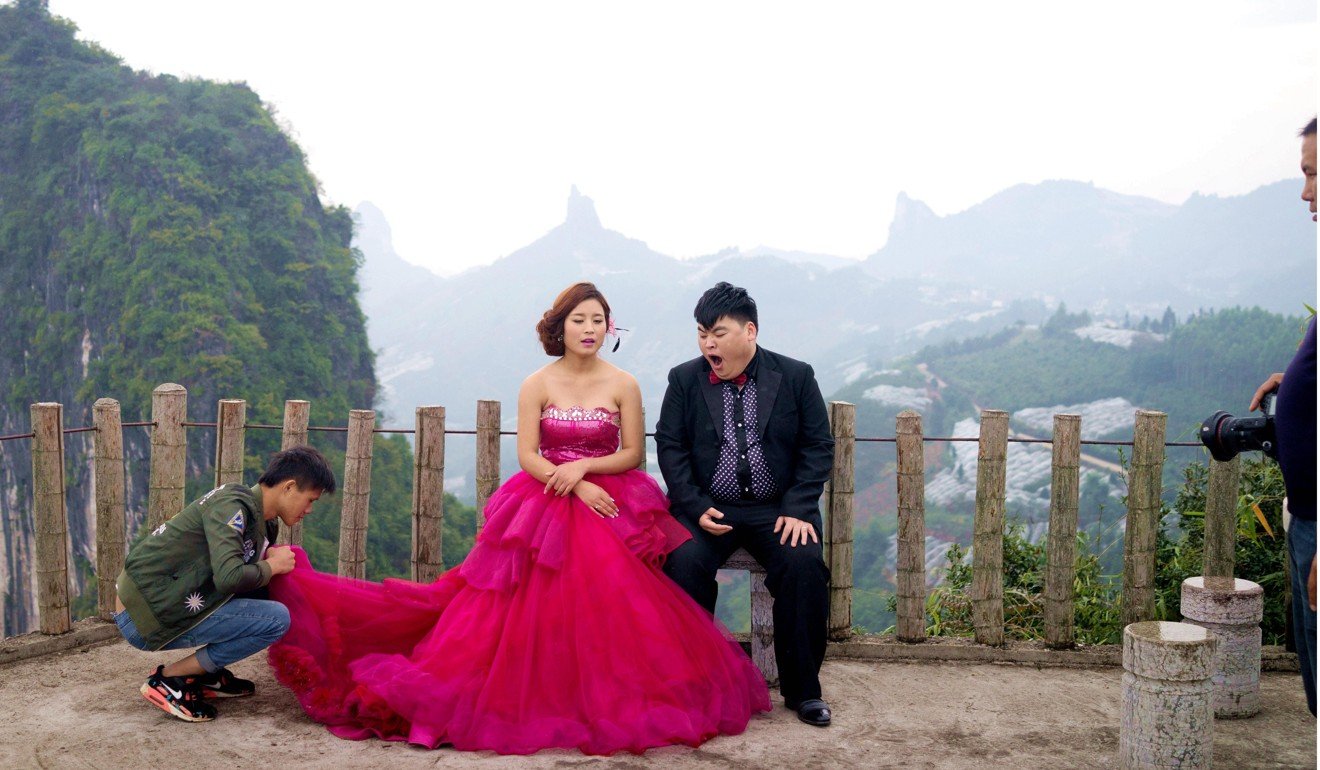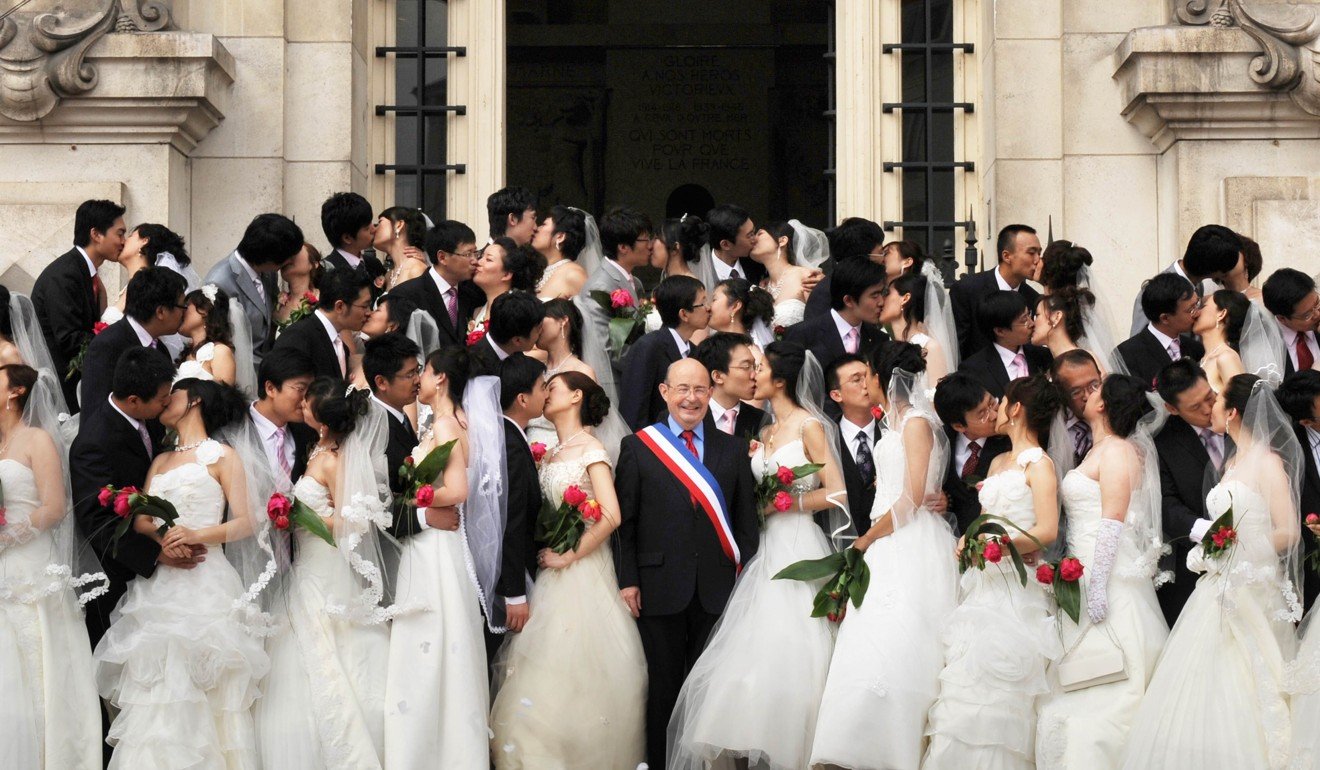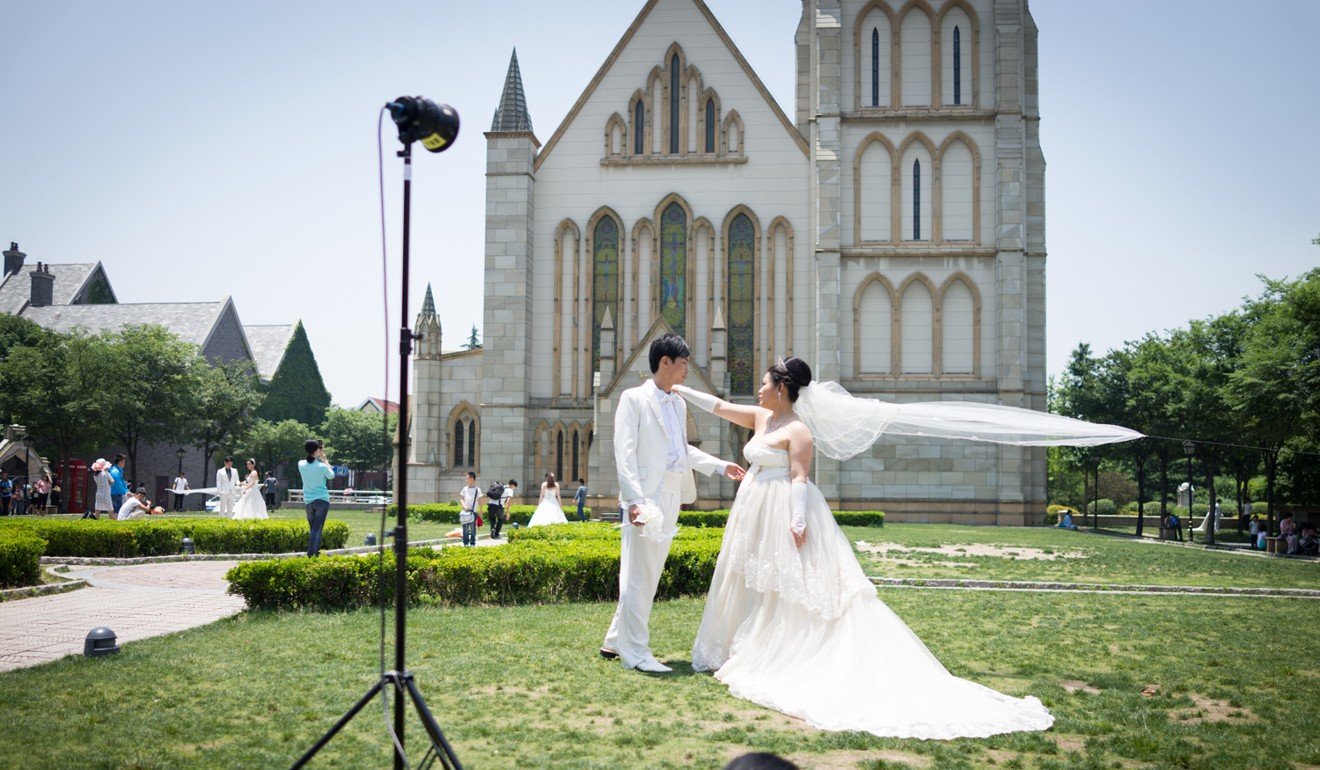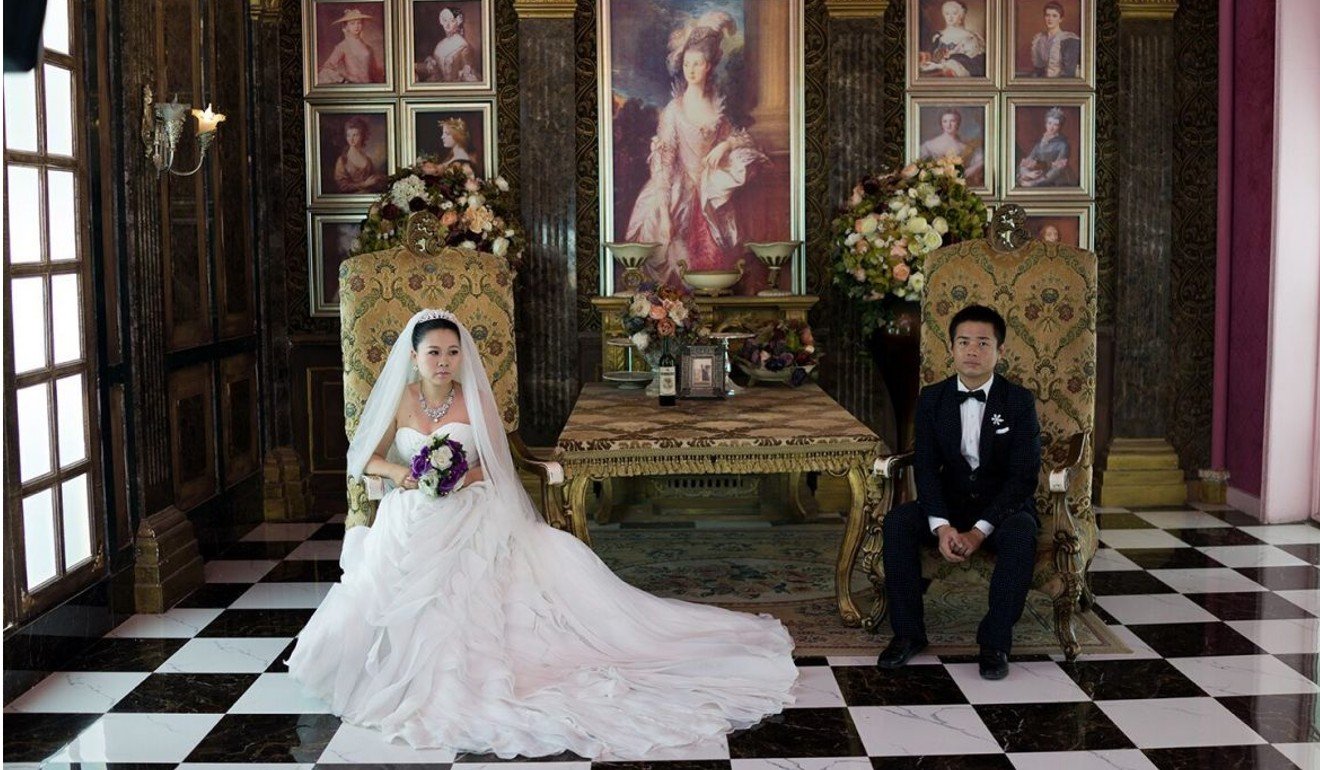
China Love documentary explores the country’s pre-wedding photo shoot industry
- Olivia Martin-McGuire became fascinated by flamboyant pre-wedding photoshoots and the Chinese concept of love after she moved to Shanghai
- She published her first photo series in 2016 and her documentary China Love premiered in Sydney
When she visited China for the first time in 2004, Australian-born photographer-turned-director Olivia Martin-McGuire fell in love with its “pioneering spirit and upbeat pace”.
A decade later she found herself living in Shanghai with her husband and children. Over the course of four years in the city, Martin-McGuire became fascinated by love and romance in Chinese society – in particular the phenomenon of the lavish pre-wedding photos.
“I started noticing couples on every street being photographed in flamboyant wedding costumes. Delving deeper, I discovered this offered a curious window into understanding China,” says Martin-McGuire, who is now based in Hong Kong.
“It got me thinking … what is love in China? What is the dream, what is the fantasy?”

Her fascination grew as Martin-McGuire captured these scenes with her camera. Her first photo series was published in a magazine in 2016. She then decided to take her interest to another level and make a documentary.
China Love was released last year. It was an Australian Documentary Prize finalist at the Sydney Film Festival, where it premiered in June, and screened nationwide in Australia earlier this month.
The film is a portrait of love in modern China, illustrating how the costly and theatrical nature of pre-wedding photo shoots has become a big part of the dream wedding. Through its stories, however, it also reflects how the tradition of wedlock is changing rapidly as China develops, and the tensions that can arise between younger, freedom-loving Chinese and their more conservative parents.
“The film follows five different storylines, and also questions why these pre-wedding photos are so important in Chinese modern culture,” Martin-McGuire says.
The phenomenon has become big business. She cites figures from a China Wedding Industry Development Report that estimated US$80 billion was spent on weddings in 2015, up from US$57 billion four years earlier. Couples were typically spending between 20 per cent and 25 per cent of their nuptials budget on photo shoots, according to the report.
The cultural significance of the pre-wedding shoot is highlighted in the story of Chinese bride-to-be Jenny and her fiancé David, a white Australian banker.
“They are a very fun couple,” Martin-McGuire narrates in the film. “He’s a very down-to-earth Australian and she’s from Urumqi.”

The couple are filmed zooming through the streets of Shanghai on a motorbike, before stopping at a corner.
“I want to have wedding photos taken underwater,” says Jenny, “You know, and then we can …”
“I won’t do that,” David interrupts.
Later, we see that David has relented, and the couple are having their photos taken underwater, wearing white wedding attire and holding up a sign bearing the word “LOVE” in red letters.
“He doesn’t really understand the idea of the pre-wedding photos at all, and doesn’t want to do something that seems so unnatural to him, and unrealistic,” Martin-McGuire explains.
“But he ends up coming around to the idea, because he realises it is so important to Jenny, as it is to every Chinese person.”
The director puts his resistance down to how Australian culture expects men to behave manly.
“I think David really struggled with the idea because he found it embarrassing, whereas I think that Chinese men are much more willing to follow the woman’s dream. In fact it goes much further than that. It’s a tradition which is really important to both Chinese men and women, and to their parents and grandparents.
“Every couple marrying in China will take part in a pre-wedding shoot up to one year before the actual ceremony,” Martin-McGuire adds. “The day involves several costume and backdrop changes, where you can become a character in any fantasy you choose. In more exotic locations, couples will pay up to US$250,000 for the shoot.”
Martin-McGuire explains that the images are not only intended to be a record of the marriage, but more importantly, proof of the love, romance, freedom and financial resources.

“It’s a new world,” Jenny says in the voice-over, as she is shown – after a change of garments – descending into the water again, in a magnificent flowing red chiffon dress and in the arms of her fiancé. They are filmed floating dreamily around coral reefs.”
Love in China, Martin-McGuire says, is such a feel-good experience for everyone – a social panacea – and the pre-wedding glitz is aimed at putting that love on show to make friends and relatives feel happy.
“It’s not just an individual thing about what you want in love, but it’s also about a strong love for your family and your community, and what’s right for everyone,” she says.
A businessman who has had a huge impact on the industry also makes an appearance in the documentary.
Jiahao Group founder Allen Shi, known as the godfather of the wedding photo industry, has studios in 30 cities across China – offering factory-style studios with mock sets and Photoshopped backdrops – and a presence in seven locations around the world.
“Every day we have 2,000 customers,” the Shanghai native and self-made billionaire says. “It’s not just a business; it’s like a war.”
Another commentator chips in: “He’s the wedding king. He sells happiness.”

The Chinese government has taken a dimmer view. In December, Beijing poured cold water on the spectacular photo shoots, calling for an end to such “vulgar” new wedding traditions.
The lavish affairs are not intended only to be ostentatious, however, Martin-McGuire says. They signify a couple’s freedom in finding love.
Only a generation ago, the communist Chinese state forbade any such showy behaviour. Weddings were arranged by the state, army or family, and documented with a simple black-and-white portrait, with couples looking as though they were posing for a passport photo. As many as five couples could be grouped together for the occasion, Martin-McGuire says.
“Couples were matched for the practicalities of social responsibility, for their families, and ultimately for their country. Wedding photos existed solely as proof of the marriage.”
Nevertheless, China Love documents how some older couples who did find true love are making up for lost opportunities by getting in on the new trend.
In one intimate and poignant scene, friends and relatives attend the photo session and wedding ceremony of Peipe and Xuezhong, in their small suburban flat in Shanghai.
“[They were] oppressed for so long, then suddenly they find freedom to pursue these things. Nobody could even have dreamed about it 30 years ago,” says one young woman present at the ceremony, as the elderly couple wipe tears from their eyes.
“To photograph yourself, to do proper wedding photos [decades] later … it shows older family members lived through hell. Look how far we’ve come,” a male onlooker adds.

A kind of collective healing is taking place in these photos, she says. A healing of the wounds inflicted during the Cultural Revolution, from 1966 to 1976, when anyone who sought to beautify themselves, or stand out from the crowd, would be publicly humiliated.
These wounds still linger for some. The documentary evokes drama between couples who find themselves torn between new and old traditions. Emotions ride high when those who have found freedom cross swords with those still fighting for it.
One vignette documents the pre-wedding woes of Will and Viona, from Hangzhou, including the bride-to-be’s “struggles against a very traditional Chinese family and their expectations”, Martin-McGuire says.
“She wants the freedom to be able to do it her way,” the filmmaker says, referring to Viona, who spent six years studying in Australia, free from conservative Chinese strictures.
The story of Li and Junbo, from Anhui, offers yet another perspective on the family dynamics of Chinese weddings.
“Li’s father was quite grief-stricken [at the thought of losing his daughter], so it offered us a far more real portrait of traditional weddings in China,” Martin-McGuire says.
“Filming it also gave me the opportunity to get a look in at a more realistic side of love and weddings – couples who would not be spending heaps of money getting photos.
“Getting behind the scenes like this I really got to see and learn about the warmth of family and community that exists in China,” she says.

